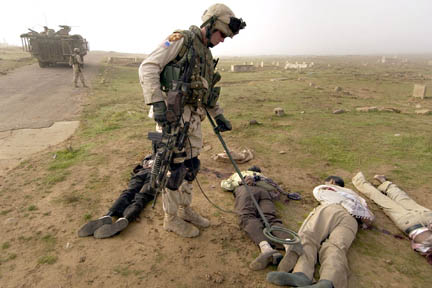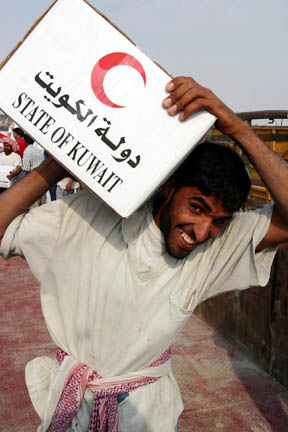— ADVERTISEMENT —

[ WAR IN IRAQ ]
 ASSOCIATED PRESS
ASSOCIATED PRESS
A U.S. Army soldier checked for possible booby traps and explosives after the bodies of four murdered men were found yesterday in a cemetery in Mosul, Iraq. Ten bodies were recovered yesterday in Mosul, where at least 50 people have been murdered in the last 10 days.
Relief slowly returns
to battered Fallujah
Marines forge an uneasy alliance
with the Red Crescent to help
distribute aid
FALLUJAH, IRAQ » The convoy of trucks and ambulances from the Iraqi Red Crescent rolled up yesterday to the checkpoint at the edge of Fallujah, as part of the balancing act of providing relief to a city that remains a fluid war zone.
Members of the Red Crescent, the Iraqi equivalent of the Red Cross, began working in Fallujah last week. But friction over their role in the city, escort and security arrangements and, separately, a history of such convoys being used to carry weapons to insurgents led to a high-level meeting with U.S. commanders yesterday.
The convoy that arrived yesterday late in the afternoon with white flags marked with red crescents, at the checkpoint on the eastern edge of the city on the road to Baghdad, was thoroughly searched by U.S. and Iraqi forces before being allowed to pass.
Part of the mission was to "work out misunderstandings" with U.S. troops who invaded Fallujah earlier this month, Red Crescent President Said Hakki told the Marine battalion chief as the two stood among sand-filled barriers during the search.
Lt. Col. Michael Ramos, commander of the 1st Battalion, 3rd Marines, overseeing the convoy arrival, replied that Marines had delivered food to 15 families the day before but that fighting had erupted 300 yards away.
"That will be a plus in God's eyes," Hakki told the Marine officer. "We'll work with you. Your mission is part of our mission. You have security issues and this is the priority. Humanitarian work comes second."
"Hopefully, they can be done together," Ramos replied. "Yesterday was kind of an experiment that we're going to repeat on a larger scale."
So far, no other relief agency has been permitted to enter Fallujah, where senior commanders estimate that only half the estimated 50,000 houses in the city have been searched so far.
U.S. officers plan to open every door, and the weekend brought more examples of why U.S. forces here say they are pursuing the door-to-door policy.
 ASSOCIATED PRESS
ASSOCIATED PRESS
An Iraqi worker unloads a truck carrying aid sent by the Kuwait's Red Crescent to the people of Fallujah. Kuwait's Red Crescent sent 120 tons of aid to Iraq.
Militant outpost
Yesterday, one platoon of the Light Armored Reconnaissance company discovered a control center that could explode at least eight improvised explosive devices, the kind of roadside bombs that have inflicted large numbers of deaths across Iraq. The control center was set inside a normal building, with a wide horizon view of the main highway that cuts through the city. Each IED was labeled, and the operator had only to touch the copper wire for the battery to set off the explosive.On Saturday the 1st Battalion, 8th Marines engaged in a serious battle in the south of Fallujah that killed two Marines and wounded several others. As the fight continued, Marines estimated that they had killed 34 insurgents and captured another 23, at least 10 of whom were foreign fighters.
Also Saturday, Bravo company of the 1st Battalion, 3rd Marines, found two vast weapons caches in the northeast of the city, which is considered to be the most "cleaned" so far, and therefore the most likely to see the earliest return of civilians.
"We've been through half the doors. It's a necessary but laborious process going on," says Col. Craig Tucker, commander of the Regimental Combat Team-7, one of two regiments active in Fallujah. "We'll go through every house in this city. We'll bring back people by sectors, but we don't want to bring people back while we are still finding 100 105 mm (artillery) rounds in a single house."
That fluid security environment has convinced the Red Crescent, which, like its parent organizations in the West, strives to keep "neutral" in its work, that it must coordinate with U.S. forces in Fallujah.
Lessons learned
Hakki says that the organization has learned a lesson from August, when fighting in Najaf and Karbala between U.S. units and Shiite Muslims claimed the lives of three Red Crescent staff and left 16 wounded, half of them seriously."Rebuilding a town is a lot more difficult than destroying it -- it's an arduous task but not insurmountable," said Hakki in an interview later. "We must coordinate; it's safer for us. We do not want to be seen to be protected or driven (by the U.S. forces).
"The people in Fallujah are different from those in Najaf," Hakki adds. "If they think you are cooperating with the Americans against their interests, then it's over. It's irreversible."
The Red Crescent, after setting up last week and despite a 24-hour-a-day curfew imposed on the city, sent its ambulances out into the city with loudspeakers, calling for people in need to come outdoors. They collected 110 people, most of them military-age males.
Hakki says that "we check everything we do" when asked about past incidents, including one at this same checkpoint during fighting in Fallujah last April, when Marines discovered weapons in a Red Crescent food convoy.
"We're responsible for it," Hakki says. "We tell people of Fallujah, 'Please don't put us in harm's way, or we can't support you.'"
The transition to humanitarian work is also difficult for Marines, who have spent three weeks in a virtual ghost town, clearing buildings with large quantities of explosives and grenades with little need to be concerned for civilian casualties.
"It's hard to shift gears from taking down buildings, to, when peace breaks out, doing more police and security work," says Ramos.
"Some people are bitter, some are afraid and some are angry -- there is a lot of psychological trauma -- (but) I don't know if this (assault on the city) could have been done another way," says Hakki.
He says he saw one man in Fallujah step out of his house and look at the destruction all around him. "This is all our doing, this is what we have done, this is what we deserve!" the man lamented. "We hung up (the four American contractors), we tortured (hostages) and put them on television."
— ADVERTISEMENTS —
— ADVERTISEMENTS —